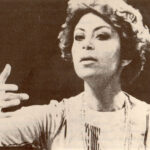Antonio Stradivari (1644 – 18 December 1737) was an Italian luthier and is considered the most significant and greatest artisan in this field.
Author Archives: Reza Ziaei
Latest posts
- Transition to Enlightenment: Six Lectures on Mozart’s String Quartets (5)
- Nasser Masoudi: The Voice of Gilan and a Legacy of Iranian Music
- Farhad Poupel: The Voice of the Shahnameh in the Orchestras Around the World
- Five Major Myths About Mozart’s Life
- Bahma Rajabi Passed Away!
- Reza Vohdani; Unveiling unpublished works, preservation of Iranian classical music
- Ahmad Pejman Passed Away!
- Timeless or Timely: The Role of Historical Context in Defining Artistic Value
- Leading the Charge in Censorship
- The Legacy of Khosrow Jafarzadeh
- Transition to Enlightenment: Six Lectures on Mozart’s String Quartets (4)
- Fereydoun Shahbazian, An Iranian Musical Icon Passed Away
From Past Days…

Avaye Naerika Percussion Orchestra
Avaye Naerika Percussion Orchestra is an Iranian percussion orchestra featuring 40 lady percussionists. The Orchestra was established as Iran’s largest all-female percussion orchestra in 2008 by Ms. Minoo Rezaei under the title Naerika Percussion Orchestra and changed its name to Avaye Naerika in 2017.

“I Will Never Perform Just for Women!”: Golnoush Khaleghi Passes Away in Exile
Golnoush Khaleghi, first Persian woman conductor and daughter of legendary composer Rouhollah Khaleghi, passed away on February 14. She was 80. Golnoush Khaleghi was the conductor of the NIRT (National Iranian Radio & Television) Choir in the 1970s. Shortly after the 1979 Islamic Revolution Ms. Khaleghi moved to the United States and founded the Rouhollah…
Read More

Non-profit “Microtona” Project Released
Microtona is a sixty-eight-page Booklet with personal comments by the contributing microtonal artists. The booklet also includes a DVD which consists of 8 original video tracks and 9 original audio tracks. The project is an international one featuring unpublished pieces by composers from Iran, Japan, U.S., France, Austria, Germany and Belgium.

Music education in third-world countries
Music education in third-world countries is facing many problems that limit access to it and it’s full of challenges. These rising and falling obstacles are made of the socioeconomic, cultural educational systems, etc.

Layla Ramezan, Iranian Pianist
Iranian pianist Layla Ramezan has always sought to create a connection between her Persian origin and the contemporary music which she encounters daily. Sound, phrasing, a particular sense of rhythm and a refined understanding of the “time of musical development” are the foremost qualities of her interpretations. Her musical and pianistic education began in Tehran at the age of 8 with Mostafa-Kamal Poortorab. Having moved to Paris and received a scholarship from Albert Roussel Foundation, she integrated the classes of Jean Micault and Devi Erlih at the Ecole Normale de Musique de Paris Alfred Cortot, where she received a Diplôme de Virtuosité in piano performance and chamber music.

Polyphony in Iranian Music (II)
With regard to each polyphonic form, only one specific and distinguished example is analyzed. These polyphonic forms are as follows:

Harmony in the Iranian Music (II)
One of his works was the translation of Harmony, which was carried out with the help of Mozayyan al-Dowleh, and included a pamphlet based on which he used to teach the subject to the students of the school of music; the pamphlet was never published. It was, in fact, a kind of simple harmony for the piano with no quadriads, it rather featured the engagement of both the right hand and the left hand which was being taught at the music school for the first time. Salar-Mo’azez also composed military marches and hymns for schools, which he harmonized to be performed and piano. Likewise, he used to compose for military orchestras.

Last Year under the Light of Music
Almost three months into the new Iranian year (starting March 21), it is still not too late to have a look at the last year and the challenges that the musicians faced. The following article was published on the first day of the New Year in the Persian edition of the HarmonyTalk journal.

Principles of Violin Playing (VII)
4.3.1.3 Regarding the great linear distance and the unusual distance between the first and forth fingers, the first finger while playing the doubles of ninth and tenth interval, can be twisted in the knuckle area and the point mentioned in 3.1.2.5 paragraph in relation to the way first finger is placed indicating that the first joint of this finger in back of hand must be in line with the direction of forearm and left hand is not true here.

Is the Iranian National Anthem a Copy? (I)
The alleged similarity between the Iranian and South Korean National Anthems has been a matter of discussion among musicians in Iran for several years. Earlier in 2021, the issue was taken to the media again with not only claims that the anthem is very similar to another song but also the suggestion that its musical content should draw more on the Iranian national music. Some even went to the extent to suggest replacing it with the song “O, Iran” composed by the late Rouhollah Khaleghi. Before delving more into the main issue, it would not go amiss to consider some technical characteristics of the song “O, Iran” composed in 1944.